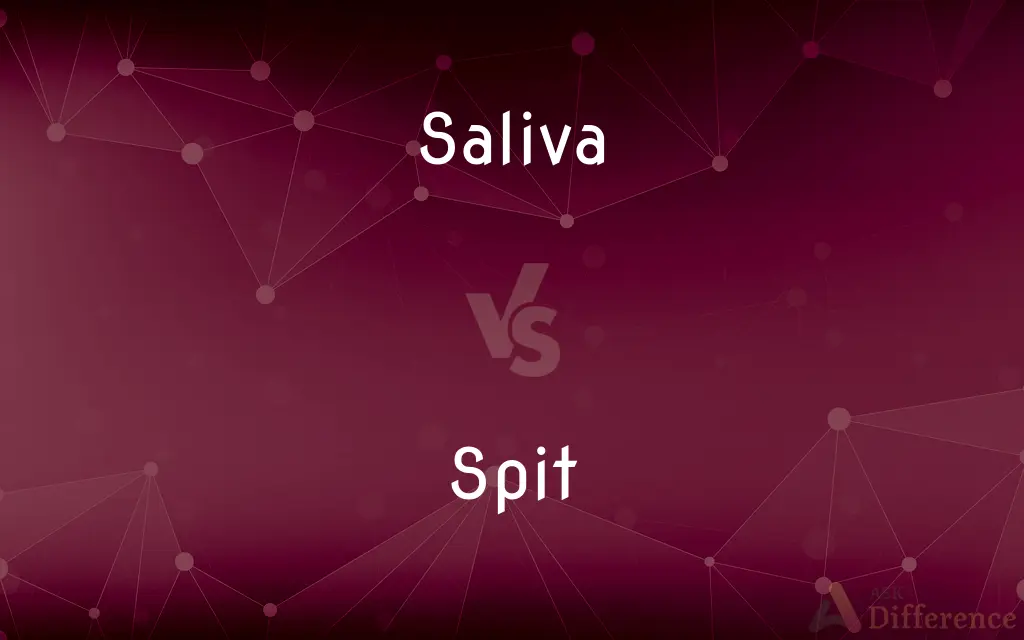Saliva vs. Spit — What's the Difference?
Edited by Tayyaba Rehman — By Urooj Arif — Updated on March 29, 2024
Saliva is a naturally produced fluid in the mouth, aiding in digestion and oral health; spit, however, is saliva once expelled from the mouth.

Difference Between Saliva and Spit
Table of Contents
ADVERTISEMENT
Key Differences
Saliva plays a crucial role in beginning the digestive process by breaking down food, while it also helps in keeping the mouth moist and protecting teeth from decay. Whereas spit, essentially the same fluid, is often associated with the act of expelling saliva from the mouth, which can be a voluntary or involuntary reaction to various stimuli.
Saliva contains enzymes like amylase and lipase that start the digestion of starches and fats, making the food easier to swallow. On the other hand, when saliva turns into spit, it may carry with it food particles, bacteria, or other substances, serving as a means of cleansing the mouth or a response to irritants.
While saliva constantly serves several purposes inside the mouth, including antibacterial actions and aiding in taste perception, spit is often seen in a negative light, culturally considered rude or unhygienic when done in public.
Saliva's production is a continuous, natural process influenced by the sight, smell, or thought of food, demonstrating the body's preparatory steps for digestion. Spit, in contrast, can be a deliberate action or a reflex, such as spitting out something unpleasant or as part of a traditional sign of disdain.
Comparison Chart
Definition
Fluid produced in the mouth
Expelled saliva
ADVERTISEMENT
Primary Function
Aids digestion, oral health
Disposal or reaction mechanism
Composition
Enzymes, water, mucus
Same as saliva, possibly with contaminants
Cultural Perception
Neutral, rarely discussed
Often considered rude or unhygienic
Production
Continuous and natural
Occurs through an act of expulsion
Compare with Definitions
Saliva
A vital component in oral health. containing enzymes and proteins.
Saliva's enzymes break down food particles stuck in teeth.
Spit
To eject saliva forcibly from one's mouth.
He spit the bitter medicine out.
Saliva
A clear liquid secreted into the mouth by the salivary glands.
Saliva helps in tasting and digesting the food.
Spit
The act of expelling saliva or substances from the mouth.
Spit can be a reflex to expel unwanted particles.
Saliva
The fluid that moistens the mouth and begins the process of digestion.
The doctor explained how saliva fights against mouth bacteria.
Spit
Saliva that has been expelled. especially as a sign of disrespect.
Spitting in public is frowned upon.
Saliva
An important factor in taste perception.
Without enough saliva, tasting food properly becomes difficult.
Spit
A means to cleanse the mouth or respond to irritants.
After tasting something sour. she spit it out immediately.
Saliva
A substance that aids in the swallowing of food.
Saliva makes dry food easier to swallow by moistening it.
Spit
A voluntary or involuntary expulsion of saliva.
Spit can spread germs when not properly managed.
Saliva
Saliva (commonly referred to as spit) is an extracellular fluid produced and secreted by salivary glands in the mouth. In humans, saliva is 98% water plus electrolytes, mucus, white blood cells, epithelial cells (from which DNA can be extracted), enzymes (such as amylase and lipase), antimicrobial agents such as secretory IgA, and lysozymes.The enzymes found in saliva are essential in beginning the process of digestion of dietary starches and fats.
Spit
Saliva, especially when expectorated; spittle.
Saliva
Watery liquid secreted into the mouth by glands, providing lubrication for chewing and swallowing, and aiding digestion.
Spit
The act of expectorating.
Saliva
The watery mixture of secretions from the salivary and oral mucous glands that lubricates chewed food, moistens the oral walls, and contains ptyalin.
Spit
Something, such as the frothy secretion of spittle bugs, that resembles spit.
Saliva
(physiology) A clear, slightly alkaline liquid secreted into the mouth by the salivary glands and mucous glands, consisting of water, mucin, protein, and enzymes. It moistens the mouth, lubricates ingested food, and begins the breakdown of starches.
Spit
A brief, scattered rainfall or snowfall.
Saliva
The secretion from the salivary glands.
Spit
(Informal) The perfect likeness
He's the spit and image of his father.
Saliva
A clear liquid secreted into the mouth by the salivary glands and mucous glands of the mouth; moistens the mouth and starts the digestion of starches
Spit
A slender, pointed rod on which meat is impaled for roasting.
Spit
A narrow point of land extending into a body of water.
Spit
To eject from the mouth
Spat out the grape seeds.
Spit
To eject as if from the mouth
A fire spitting sparks.
Spit
To emit suddenly and forcefully
Spat out an insult.
Spit
To eject matter from the mouth; expectorate.
Spit
To express contempt or animosity, especially by ejecting matter from the mouth.
Spit
To make a hissing or sputtering noise
French fries spitting in the pan.
Spit
To rain or snow in light, scattered drops or flakes.
Spit
To impale on or as if on a spit.
Spit
A thin metal or wooden rod on which meat is skewered for cooking, often over a fire.
Spit
A generally low, narrow, pointed, usually sandy peninsula.
Spit
(uncountable) Saliva, especially when expectorated.
There was spit all over the washbasin.
Spit
(countable) An instance of spitting; specifically, a light fall of rain or snow.
Spit
A person who exactly resembles someone else (usually in set phrases; see spitting image).
Spit
(uncountable) slam
Spit
The depth to which the blade of a spade goes into the soil when it is used for digging; a layer of soil of the depth of a spade's blade.
Spit
The amount of soil that a spade holds; a spadeful.
Spit
(transitive) To impale on a spit; to pierce with a sharp object.
To spit a loin of veal
Spit
(transitive) To use a spit to cook; to attend to food that is cooking on a spit.
She’s spitting the roast in the kitchen.
Spit
(ambitransitive) To evacuate (saliva or another substance) from the mouth, etc.
Spit
(ambitransitive) To emit or expel in a manner similar to evacuating saliva from the mouth.
A hot pan spitting droplets of fat
Spit
(impersonal) To rain or snow slightly.
Spit
(ambitransitive) To utter (something) violently.
Spit
(intransitive) To make a spitting sound, like an angry cat.
Spit
To rap, to utter.
Spit
(in the form spitting) To spit facts; to tell the truth.
He's spitting for sure.
Spit
To dig (something) using a spade; also, to turn (the soil) using a plough.
Spit
To plant (something) using a spade.
Spit
To dig, to spade.
Spit
A long, slender, pointed rod, usually of iron, for holding meat while roasting.
Spit
A small point of land running into the sea, or a long, narrow shoal extending from the shore into the sea; as, a spit of sand.
Spit
The depth to which a spade goes in digging; a spade; a spadeful.
Spit
The secretion formed by the glands of the mouth; spitle; saliva; sputum.
Spit
To thrust a spit through; to fix upon a spit; hence, to thrust through or impale; as, to spit a loin of veal.
Spit
To spade; to dig.
Spit
To attend to a spit; to use a spit.
She's spitting in the kitchen.
Spit
To eject from the mouth; to throw out, as saliva or other matter, from the mouth.
Spit
To eject; to throw out; to belch.
Spit
To throw out saliva from the mouth.
Spit
To rain or snow slightly, or with sprinkles.
It had been spitting with rain.
Spit
A narrow strip of land that juts out into the sea
Spit
A clear liquid secreted into the mouth by the salivary glands and mucous glands of the mouth; moistens the mouth and starts the digestion of starches
Spit
A skewer for holding meat over a fire
Spit
The act of spitting (forcefully expelling saliva)
Spit
Expel or eject (saliva or phlegm or sputum) from the mouth;
The father of the victim spat at the alleged murderer
Spit
Utter with anger or contempt
Spit
Rain gently;
It has only sprinkled, but the roads are slick
Spit
Drive a skewer through;
Skewer the meat for the BBQ
Common Curiosities
What is saliva?
Saliva is a digestive fluid produced in the mouth, essential for oral health and digestion.
What is spit?
Spit is the act of expelling saliva from the mouth or the expelled saliva itself.
Is it possible to control saliva production?
While difficult to control directly, factors like hydration and certain medications can influence saliva production.
Can saliva prevent tooth decay?
Yes, saliva neutralizes acids and provides minerals that protect against decay.
How much saliva does a person produce daily?
An average person produces about 0.5 to 1.5 liters of saliva daily.
How does saliva aid digestion?
Saliva contains enzymes that break down starches and fats, starting the digestive process.
Is there a difference between saliva and spit?
Yes, saliva refers to the fluid produced in the mouth, while spit refers to saliva once it has been expelled.
Is spitting considered unhygienic?
Yes, spitting in public is often viewed as unhygienic and rude.
Can you run out of saliva?
Conditions like dry mouth can significantly reduce saliva production, but complete cessation is rare.
Can saliva be used in medical diagnostics?
Yes, saliva can be analyzed to detect various diseases, including viral and bacterial infections.
Why do people spit?
People may spit to expel unwanted substances, as a reflex, or as a cultural or emotional expression.
What role does saliva play in taste?
Saliva is essential for dissolving taste substances, allowing them to interact with taste receptors on the tongue.
What enzymes are found in saliva?
Saliva contains enzymes like amylase and lipase, crucial for digesting starches and fats.
Why is spitting considered rude in many cultures?
Spitting is often seen as a sign of disrespect or disgust, and it can spread germs.
Do all animals produce saliva?
Most animals do produce saliva, though its composition and purpose vary widely.
Share Your Discovery

Previous Comparison
Class vs. Division
Next Comparison
Kingdom vs. DynastyAuthor Spotlight
Written by
Urooj ArifUrooj is a skilled content writer at Ask Difference, known for her exceptional ability to simplify complex topics into engaging and informative content. With a passion for research and a flair for clear, concise writing, she consistently delivers articles that resonate with our diverse audience.
Edited by
Tayyaba RehmanTayyaba Rehman is a distinguished writer, currently serving as a primary contributor to askdifference.com. As a researcher in semantics and etymology, Tayyaba's passion for the complexity of languages and their distinctions has found a perfect home on the platform. Tayyaba delves into the intricacies of language, distinguishing between commonly confused words and phrases, thereby providing clarity for readers worldwide.
















































